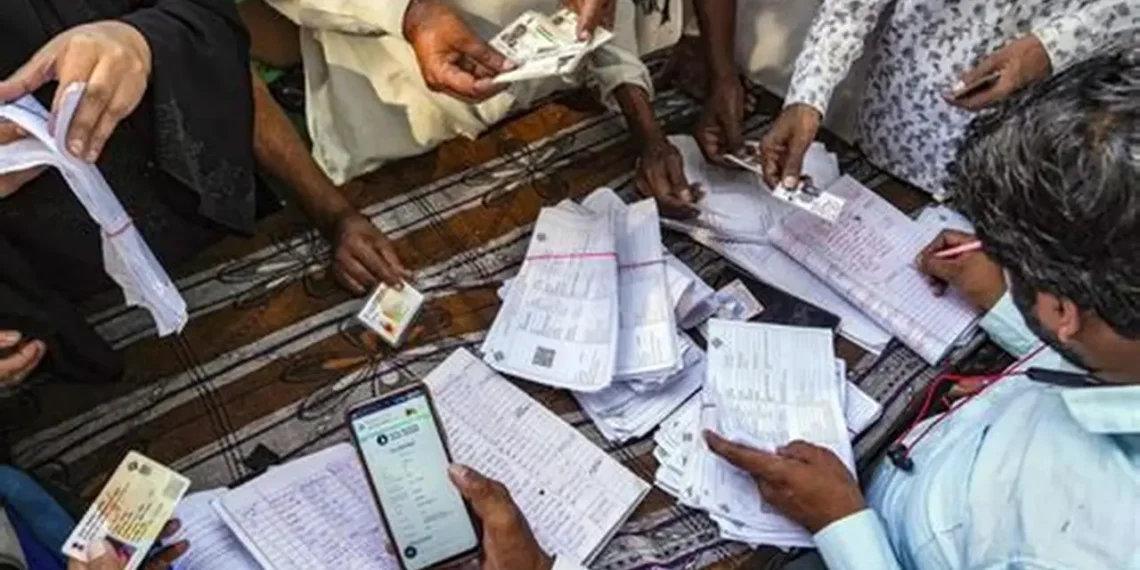Despite serious media reports accusing Booth Level Officers of forging signatures and rigging, the ECI maintains it has ensured due process in Bihar’s Special Intensive Revision.
BY PC Bureau
Facing mounting accusations of ‘vote theft,’ the Election Commission of India (ECI) has now promised to assist citizens in obtaining necessary documents to complete voter identity verification formalities in Bihar’s Special Intensive Revision (SIR) process.
This shift comes after earlier controversies in which the ECI disallowed widely accepted identity proofs such as Aadhaar and EPIC cards for voter enrollment. Despite repeated advisories from the Supreme Court to consider these documents, the Commission gave no firm commitments. However, following revelations of massive errors in the draft electoral rolls and Rahul Gandhi’s allegations of widespread voter fraud in Karnataka, the ECI appears to be adopting a more flexible stance in Bihar.
READ: Border Breach: Bangladeshi Intruders Raid Meghalaya Village
In a fresh affidavit filed with the Supreme Court, the ECI assured that no names will be deleted from the draft electoral roll without prior notice and a formal order. This response came after the Association for Democratic Reforms sought a court directive for details regarding the approximately 65 lakh names removed from the draft roll published on August 1, 2025.
Imagine the level of scam by Election Commission in Bihar after SIR
Now ECI has even removed digital electronically readable SIR draft from its website. Guess why?
Will @ECISVEEP now file an affidavit that SIR in Bihar is fullproof without scam? pic.twitter.com/FuzzaS41E8
— Ankit Mayank (@mr_mayank) August 9, 2025
The affidavit emphasized the Commission’s commitment to due process:
“As a matter of policy and strict adherence to the principles of natural justice, no deletion of any elector’s name from the draft electoral roll shall be undertaken without issuance of a prior notice to the concerned elector indicating the proposed deletion and the grounds thereof, affording a reasonable opportunity to be heard, furnishing relevant documents, and passing a reasoned and speaking order by the competent authority.”
READ: Selective Silence? How TV Channels Muted Rahul’s Twin Attacks on ECI and BJP
The ECI stressed that every possible measure has been taken to ensure no eligible voter is excluded. It highlighted a two-tier appeal system providing sufficient recourse against adverse decisions.
“Even in cases where vulnerable electors currently lack documentation, they will be facilitated in obtaining the necessary documents,” the affidavit noted, adding that out of 7.89 crore electors in Bihar, over 7.24 crore have submitted their enumeration forms.
The Commission also shared that during the scrutiny period from August 1 to September 1, printed and digital versions of the draft roll have been made available to political parties and the public via online platforms.
To boost voter participation, the ECI outlined a comprehensive plan including large-scale awareness campaigns, repeated visits by Booth Level Officers (BLOs) to communities, and other focused outreach efforts.
Addressing transparency concerns, the ECI stated that under current regulations, it is not required to publish a separate list of individuals excluded from the draft electoral roll.
However, the ECI remains silent on numerous media reports of massive rigging in preparation of Bihar’s electoral rolls. Both electronic and print media have widely reported instances where BLOs themselves filled out forms and forged voters’ signatures. Some of this evidence is irrefutable, yet the Commission has ignored these allegations. Thousands of households in Bihar reportedly never received visits from BLOs, but these complaints seem to have been overlooked by the ECI.
On August 9, 2025, the Election Commission of India (ECI) filed an additional affidavit in Association for Democratic Reforms & Ors. v. Election Commission of India (W.P. (C) No. 640 of 2025), outlining steps to ensure no eligible voter is excluded during Bihar’s ongoing Special Intensive Revision (SIR) of electoral rolls.
The filing describes early involvement of political parties, targeted outreach to vulnerable groups, and procedural safeguards against wrongful deletions. It also annexes press notes, advertisements, and records of meetings between Booth Level Officers (BLOs) and Booth Level Agents (BLAs).
Key measures presented to the Supreme Court:
Sharing “Missing Form” Lists with Political Parties
After BLOs collected enumeration forms, the ECI identified voters whose forms were missing. By July 20, 2025, booth-level lists were shared with recognised parties’ BLAs, allowing them to verify and ensure inclusion. Updated lists and records from 10 sample BLO–BLA meetings were submitted to the court.Mass Mobilisation for Coverage
Of Bihar’s 7.89 crore electors, over 7.24 crore submitted forms through a coordinated network comprising:Chief Electoral Officer, 38 District Election Officers, 243 EROs, 2,976 Assistant EROs, and 77,895 BLOs
2,45,716 volunteers and 1,60,813 BLAs from major political parties
The ECI said this reflects the “active involvement” of political parties in the process.
Targeted Inclusion for Vulnerable & Mobile Groups
Migrant Workers: Advertisements in 246 Hindi newspapers; facilitation for submissions from outside Bihar.
Urban Voters: Camps in all 261 urban local bodies.
Young Voters: Early applications for those turning 18 by October 1, 2025.
Senior Citizens, PwDs, Vulnerable Groups: 2.5 lakh volunteers deployed; coordination with State departments to provide missing ID or address proofs.
Strict Safeguards Against Wrongful Deletions
No name can be deleted without:Prior notice specifying the grounds
Opportunity to respond and submit proof
A reasoned order by the competent authority
A two-tier appeal process under Section 24 of the Representation of the People Act, 1950, backs these safeguards.
Daily Public Bulletins for Transparency
Between August 1 and September 1, 2025, the ECI is issuing daily bulletins detailing claims and objections received, actions taken, and deadlines. Public ads instruct voters on how to check rolls, file claims, and appeal deletions.
Case Background
The affidavit was filed in response to ADR’s petition seeking stronger safeguards and greater transparency in the SIR process. The ECI asserts that political parties have been involved from the outset, mobilisation has been extensive, and due process is being rigorously followed.














